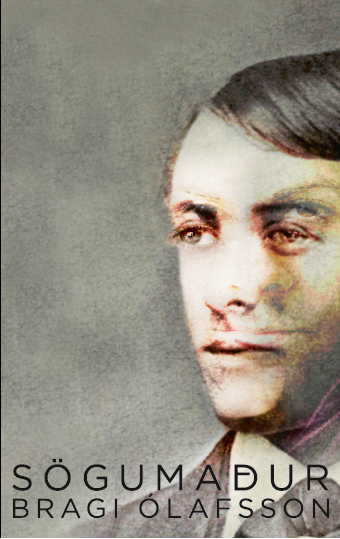On a rainy day in the middle of June, on the day England and Costa Rica meet in the World Cup, G., a thirty-five-year-old aspiring writer is waiting in line at the post office to mail off a manuscript—a story about a day in the life of a thirty-five-year-old man.
That’s when he notices a man he knows. Or rather knew. Sort of knew. A man who used to go out with a girl G. loved from afar. The only girl he’s ever loved. All his hatred of this man comes rushing back—including his foolish wish that the man would die—and he takes off, following him throughout the streets of Reykjavik. This strange game of cat and mouse takes some dark turns though, evolving into a complex, introspective journey of a man struggling to complete the unfinished narrative of his own life.
See interview: https://grapevine.is/icelandic-culture/literature-and-poetry/book-review/2018/07/26/the-reykjavik-writer-bragi-olafssons-narrator-published-by-open-letter-books/
REVIEWS
“A tight and hugely entertaining novel … Olafsson has a unique style, which in this Reykjavik saga is mesmerising and an important part of the narrative driving force … it’s the achievement of an ingenious writer to tell a story … in such an interesting way.”
MORGUNBLADID DAILY
“…the Aristotelian plot … is interesting and skilfully interwoven with other more haunting ideas about storytelling and life … The story may be both complicated and short, yet the way it’s constructed is extremely effective. Somehow there are no loose ends, and the characterisation holds up in every way despite, or perhaps because of, the complex play with the narrative.”
VIDSJA/ NATIONAL BROADCASTING SERVICE
“This is a book about obsession. That, and what is revealed in the jacket copy – an aspiring 35-year-old writer notices, by chance, at a post office, a man of whom he used to be jealous, and decides, on the spot, to start following him – is everything you need to know about this book before you decide to read it. That is if your reading habits involve diving into a text head first and not emerging until you have reached the other side. Obsession deserves obsession.
… Narrator thus takes us on a short but intense trip into an obsessed mind, and certainly sparks interest in Ólafsson’s other novels. Two of these are already available in English and hopefully there are more to come.”
REIN RAUD, EUROLITNETWORK.COM
“This amusing story will delight fans of narrators who humorously and unintentionally implicate themselves in their own derision.”
PUBLISHERS WEEKLY
“Thinking about the form and shape of “Narrator,” I was reminded of the forms and shapes of those classic surrealist novels — André Breton’s “Nadja,” Philippe Soupault’s “Last Nights of Paris,” Lawrence Ferlinghetti’s “Her,” and others — in which narrators always end up obsessively following an entrancing figure around a city to strange, silly and tragic effect.
Here, though, instead of the figure pursued being an object of sexual desire, as is the case in those surrealist novels, Aron is an object of sexual jealousy in “Narrator,” a perpetual reminder of G.’s inadequacy in love and, more deeply, in life.
The book is also a descendant of the nouveau roman, taking formal cues from and shaping its particular version of narrative play in the mold of the enigmatic novels of writers like Alain Robbe-Grillet, Michel Butor and Nathalie Sarraute.
The world of “Narrator” is the same uncanny world of his previous novels. Characters from one Ólafsson book often appear again as characters in another. His literary influences also seem to flow freely from one book to the next. The Franz Kafka and Samuel Beckett influences, which are prominent in previous work like “The Pets,” remain, though they are perhaps less pronounced here than the surrealist and nouveau roman touchstones.
… Ólafsson does manage to take the reader on a compelling journey into the tragicomic world that erupts from man’s inability to adequately process shame and the inevitable narcissism that flows from that ineptitude.
… Each and every day we are the narrators of our own stories — analyzing our actions, explaining our feelings, translating our experiences, to ourselves and to the world. With rare exception, we cast ourselves as the tragic heroes of the stories of our lives, as G. does here. Ironically, because all narrators — yes, even you, even me — are inherently unreliable, this role of tragic hero becomes more accurate than we are ever able to comprehend.
“I wonder how I look in the eyes of the people walking past the screamingly huge window of the store?” G. ponders.
Our tragedy is our inability to assess ourselves with anything approaching third-person objectivity, to see the people we truly are, to get a glimpse, even a fleeting one, of what others see. Luckily, our comedy, of course, is the same.”
TYLER MALONE, LOS ANGELES TIMES
“You simply have to find out what happens. The balance of the book changes in your hands, slowly shifting to more pages on the left than on the right, and still, you have no clue where the story is heading. …
The plot seems fantastical — yet who hasn’t given in to imagining what might have been, with an indulgent emphasis on thinking the worst of someone? Maybe that’s the thread that keeps a reader reading, that there is more in common with G. than we’d care to admit.”
KIM ODE, STAR TRIBUNE
“The kind of novel that teaches you how to read it while you’re reading it, Narrator asks odd, fascinating questions about the function of the narrator as a character, and the reliability of self-reflections and our accounts of ourselves.”
REMY PINCUMBE, THE ARKANSAS INTERNATIONAL

